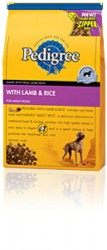|
|
|
Reviews
|
Views
|
Date of last review
|
|
1
|
36171
|
Sat March 22, 2008
|
|
|
Recommended By
|
Average Price
|
Average Rating
|
|
No recommendations
|
None indicated
|
None indicated
|
|
|
|

supersize
|
|
Description:
|
Feeding guideline:
A 50lb dog should be fed about 3-1/2 cups
INGREDIENTS
GROUND WHOLE CORN, CHICKEN BY-PRODUCT MEAL, GROUND WHEAT, MEAT AND BONE MEAL, ANIMAL FAT (PRESERVED WITH BHA/BHT), WHEAT FLOUR, LAMB, RICE, CORN GLUTEN MEAL, NATURAL FLAVOR, SALT, POTASSIUM CHLORIDE, DICALCIUM PHOSPHATE, VEGETABLE OIL (SOURCE OF LINOLEIC ACID), CARAMEL COLOR, DRIED BEET PULP, TITANIUM DIOXIDE, VITAMINS (CHOLINE CHLORIDE, dl-ALPHA TOCOPHEROL ACETATE [SOURCE OF VITAMIN E], L-ASCORBYL-2-POLYPHOSPHATE [SOURCE OF VITAMIN C*], VITAMIN A SUPPLEMENT, THIAMINE MONONITRATE [VITAMIN B1], BIOTIN, d-CALCIUM PANTOTHENATE, RIBOFLAVIN SUPPLEMENT [VITAMIN B2], VITAMIN D3 SUPPLEMENT, VITAMIN B12 SUPPLEMENT), MINERALS (ZINC SULFATE, ZINC PROTEINATE, COPPER SULFATE, COPPER PROTEINATE, MANGANESE PROTEINATE, POTASSIUM IODIDE), ADDED FD&C AND LAKE COLORS (YELLOW 6, YELLOW 5, BLUE 2, RED 40).
GUARANTEED ANALYSIS
CRUDE PROTEIN--- MIN. 22.0%
CRUDE FAT---MIN. 12.0%
CRUDE FIBER---MAX. 4.0%
MOISTURE ---MAX. 12.0%
LINOLEIC ACID (Omega 6 Fatty Acid)---MIN. 2.0%
VITAMIN E --- MIN. 225 IU/kg
ASCORBIC ACID (VIT. C*) ---MIN. 70 mg/kg
*NOT RECOGNIZED AS AN ESSENTIAL NUTRIENT BY THE AAFCO DOG FOOD NUTRIENT PROFILES.
|
|
|
|
Editors
Registered: October 2005
Posts: 3953
|
|
Review Date: Sat March 22, 2008
|
Would you recommend the product? No |
Price you paid?: Not Indicated
| Rating: 0
|
|
Pros:
|
|
|
Cons:
|
Inadequate meat content, low quality grain, low quality meat products, byproducts, fat of unidentifiable origin, artificial colorant, controversial filler, chemical preservatives
|
|
The primary ingredient in this food is corn. Corn is a difficult to digest grain of limited value in dog food, and which is also commonly associated with food allergies. Even if this had been a good quality grain, we would still note that grains are an unnatural foodstuff for canines, and that dog food products should be based on meat rather than grain. Corn gluten meal, further down the ingredient list, is also low quality. This is defined as that part of the commercial shelled corn that remains after the extraction of the larger portion of the starch, gluten, and term by the processes employed in the wet milling manufacture of corn starch or syrup. In plain English, the remains of corn after most of the nutritious bits have been removed. Rice is a decent quality grain.
The next ingredient is byproducts. It is impossible to ascertain the quality of by-products and these are usually products that are of such low quality as to be rejected for use in the human food chain, or else are those parts that have so little value that they cannot be used elsewhere in either the human or pet food industries. The AAFCO definition of chicken by-product meal is ‚Äúconsisting of the ground, rendered, clean parts of the carcass of slaughtered chicken, such as necks, feet, undeveloped eggs and intestines, exclusive of feathers, except in such amounts as might occur unavoidable in good processing practice.‚ÄĚ
Wheat flour is a further low quality ingredient. In dog food products, this is commonly a byproduct (think floorsweepings) of human food production and is a grain fragment we consider primarily filler. Wheat is believed by many to be the leading cause of food allergy problems in dog foods.
Meat and bone meal is an extremely low quality ingredient. It is the rendered product from mammal tissues, including bone, exclusive of blood, hair, hoof, horn, hide trimmings, manure, stomach and rumen contents, except in such amounts as may occur unavoidably in good processing practices. We would have greater confidence in this ingredient as fertilizer than as a dog food ingredient.
Animal fat is an ingredient of unidentified origin for which it is impossible to determine species, source or quality. Unidentified ingredients are usually very low quality. AAFCO define this asobtained from the tissues of mammals and/or poultry in the commercial processes of rendering or extracting. It consists predominantly of glyceride esters of fatty acids and contains no additions of free fatty acids. If an antioxidant is used, the common name or names must be indicated, followed by the words "used as a preservative".
This product uses chemical preservatives. BHA and BHT are allowed in dog food products but are banned or heavily regulated in human food production due to the belief that they are carcinogenic.
Beet pulp is a controversial filler. It is a by-product, being dried residue from sugar beets which has been cleaned and extracted in the process of manufacturing sugar. It is a controversial ingredient in dog food, claimed by some manufacturers to be a good source of fibre, and derided by others as an ingredient added to slow down the transition of rancid animal fats and causing stress to kidney and liver in the process. We note that beet pulp is an ingredient that commonly causes problems for dogs, including allergies and ear infections, and prefer not to see it used in dog food. There are less controversial products around if additional fibre is required.
There is no excuse for adding artificial colorings to dog food products.
|
|
|
Powered by: ReviewPost PHP
Copyright 2006 All Enthusiast, Inc.
|
|